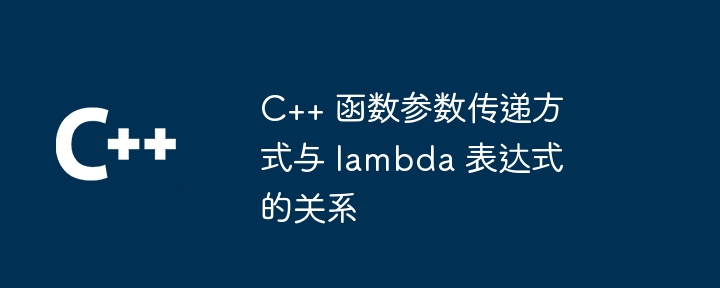Home >Backend Development >C++ >The relationship between C++ function parameter passing methods and lambda expressions
The relationship between C++ function parameter passing methods and lambda expressions
- 王林Original
- 2024-04-12 15:48:01571browse
The function parameter passing method determines the way parameters are passed between the caller and the function implementation, including value transfer, reference transfer and const reference transfer. Lambda expressions access function external variables through value capture. The capture type (value capture, reference capture, or no capture) affects the execution efficiency and modifiability of lambda expressions. In practice, pass-by-value is suitable for small built-in types, pass-by-reference is suitable for large objects or objects that need to be modified frequently, and lambda expressions enable dynamic behavior by capturing external variables and are useful for managing data transfer.

The relationship between C function parameter passing method and Lambda expression
Introduction
The function parameter passing method describes how the parameters of the C function are passed between the caller (caller) and the function implementation (callee). Lambda expressions are anonymous functions that can be created through the lambda {} keyword and are closely related to the way function parameters are passed.
Value passing
- When parameters are passed by value, a copy of the actual parameters passed by the caller to the function will be copied to the function.
- Modifications to parameters in the function will not be reflected in the caller.
- For built-in types (int, float, etc.) or POD structures, value passing overhead is lower.
Pass by reference
- When parameters are passed by reference, the memory address of the parameter passed by the caller to the function.
- Modifications to parameters in the function will be reflected in the caller.
- For large objects or objects that need to be modified frequently, passing by reference can improve efficiency.
const reference passing
- When parameters are passed by const reference, the function guarantees that the object pointed to by the memory address will not be modified.
- Similar to pass-by-reference, but provides an extra layer of protection.
Lambda expressions
- Lambda expressions use value capture to access variables outside a function.
- The way a Lambda expression captures an external variable depends on the capture type (value capture, reference capture, or no capture).
- The type of captured external variables affects the execution efficiency and modifiability of lambda expressions.
Practical case
Pass by value (int):
void add_by_value(int x) {
x++; // 不会影响调用者
}
int main() {
int a = 10;
add_by_value(a); // a 仍为 10
}Pass by reference ( int):
void add_by_ref(int &x) {
x++; // 会影响调用者
}
int main() {
int a = 10;
add_by_ref(a); // a 变为 11
}Pass by reference (string):
#include <string>
void append_to_string(std::string &s) {
s.append("suffix"); // 会影响调用者
}
int main() {
std::string str = "prefix";
append_to_string(str); // str 变为 "prefixsuffix"
}Lambda expression (value capture):
int a = 10;
auto lambda = [a] { return a + 1; }; // 值捕获
int result = lambda(); // 返回 11By understanding the relationship between function parameter passing methods and lambda expressions, developers can manage data passing efficiently and correctly in C.
The above is the detailed content of The relationship between C++ function parameter passing methods and lambda expressions. For more information, please follow other related articles on the PHP Chinese website!

